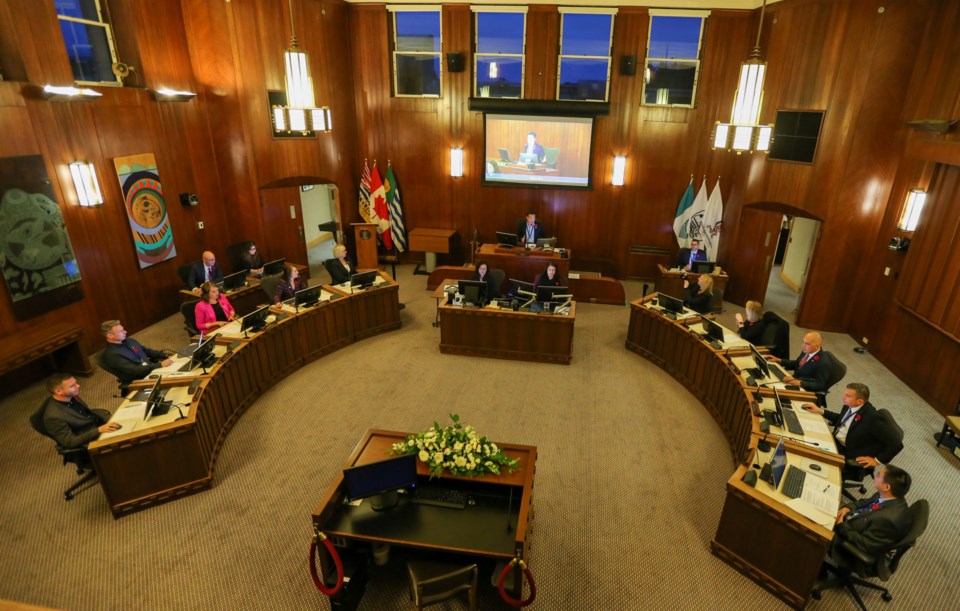Mayor Ken Sim and Vancouver’s 10 city councillors have begun 2023 with a hefty pay raise — 7.3 per cent, according to information supplied to Glacier Media from the City of Vancouver’s communications department.
The increase is almost double last year’s 3.8 per cent raise and significantly higher than the boost in 2021 (0.3 per cent), 2020 (2.3 per cent) and 2019 (2.7 per cent).
Council did not formally or publicly approve the raise because it was set in motion several years ago by a previous council after an independent panel determined annual increases were warranted based on salaries of other Canadian councillors.
The boost in pay took effect Jan. 1 and means Sim’s annual salary — which he only began receiving after he was sworn in Nov. 7 — will jump from the $185,594 allotted for the mayor last year to $199,143 this year.
The mayor's salary is calculated at 2.02 times a councillor's salary.
Sim beat Kennedy Stewart in the Oct. 15 election.
Councillors to earn $98,585
Sim’s ABC Vancouver colleagues Lenny Zhou, Brian Montague, Mike Klassen and Peter Meiszner, who are also city hall rookies, will have only earned a portion of the $91,878 set for councillors last year.
This year, all 10 councillors will earn $98,585. That salary does not include expense allowances or compensation related to board member work at Metro Vancouver.
Councillors also receive pay for duties as deputy mayor and duty councillor (monthly salary was $3,402 for both in 2022) and a monthly salary of $1,237 as acting mayor, according to 2022 compensation figures.
The percentage of the pay increase has fluctuated over the years. It has involved formulas that factor in the Consumer Price Index (CPI), a separate calculation for the mayor’s salary, the average weekly wage for B.C. and data from Statistics Canada.
Glacier Media sent emails Wednesday to Sim and the 10 councillors to comment on this year’s raise. The mayor’s chief of staff, Kareem Allam, replied on behalf of Sim, Zhou, Montague, Klassen, Meiszner and ABC colleagues Lisa Dominato, Rebecca Bligh and Sarah Kirby-Yung.
“Formulaic approaches ensure that salaries are adjusted for cost of living without political interference,” Allam said.
“Serving as a councillor in Vancouver is a full-time job. That is not always the case in other jurisdictions. For reference, Vancouver’s councillor salaries in 2022 were 25.2 per cent lower than that of BC MLAs in 2022. We support the current formulaic approach and do not intend to review the remuneration bylaw.”
'I need to be fairly compensated'
Green Party Coun. Pete Fry said in an email Wednesday that he believed the salary is appropriate, given the workload and responsibility. Fry estimated his hourly wage last year at between $30 and $35 an hour before taxes.
“By way of comparison, we are among the lowest-paid full-time councillors in Canada,” he said.
“We are paid less than most exempt city staff, with no job security beyond a four-year term, nor severance or [employment insurance]. I love the city, and I love the work – and I want to be able to continue to devote my energy to it, but I need to be fairly compensated.”
Fry was a member of the previous council that logged 474.3 hours in 2021, 549.5 in 2020 and 498.5 in 2019. The total number of days in meetings in 2021 was 153. The total number of citizens who spoke to council in 2022 was roughly 6,500.
In Edmonton, the mayor’s 2022 salary was $206,511 while councillors earned $116,672, according to the City of Edmonton’s website. As of Jan. 1, 2023, a Calgary councillor will earn $117,913 this year and the mayor, $208,707.
The compensation paid to civic politicians in Calgary this year is based on the Alberta Average Weekly Earnings measurement, which triggered a 2.41 per cent raise in 2023. The increase in 2022 was 1.60 per cent, according to a City of Calgary compensation document.
In the previous term of council, the council of the day unanimously decided in April 2020 to take a 10 per cent pay cut to help offset revenue losses faced by the city during the pandemic. The savings amounted to about $90,000 for the year.
The cut did not continue into 2021.
In the Oct. 15 election, five politicians lost their seats — Stewart, Jean Swanson, Melissa De Genova, Colleen Hardwick and Michael Wiebe. All received in their final paycheques what the city calls “deferred remuneration.”
The amount of money was based on salary and time served.
The payouts were as follows:
• Stewart, $13,717
• De Genova, $19,567
• Swanson, $6,791
• Hardwick, $6,791
• Wiebe, $6,791





